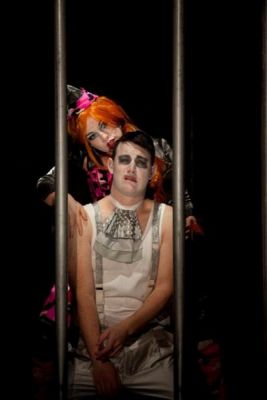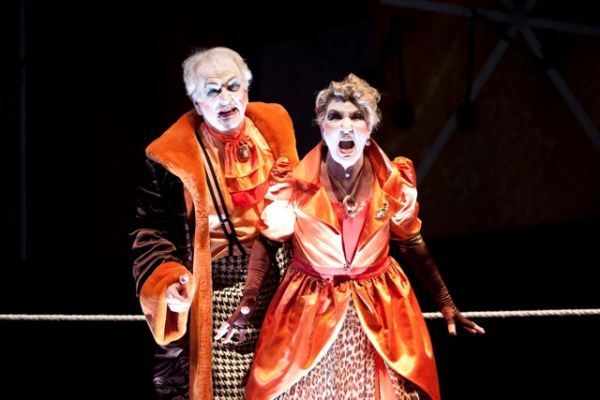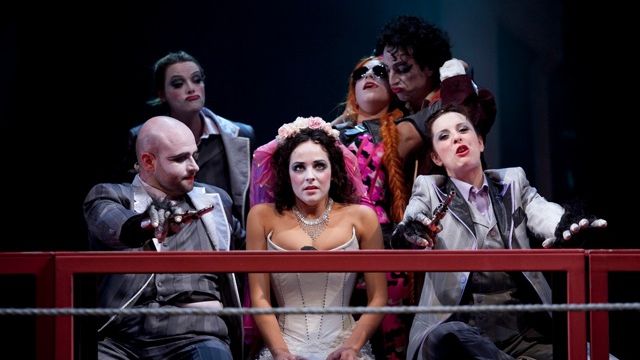The Threepenny Opera
BRECHT AND CO SHOULD SUE
Phillip Patterson wrote to Stage Whispers after he read David Spicer's review of The Threepenny Opera (which follows).
Brecht famously only wrote a portion of his massive oeuvre. He had a team of backroom helpers (often doubling as lovers), who kept the well-oiled cogs of his factory turning. For example, the whole “book” of The Threepenny Opera was almost entirely written by Elisabeth Hauptmann as an update of the John Gay folk opera; her name now appears on the work merely as a Mitarbeiter (co-worker), following some fancy carving up of credits after the play’s unexpected success. Brecht in fact had really only written the lyrics to a few of the songs (crucially Mack the Knife and The Cannon Song, its two showstoppers); many of the rest were heavily plagiarised from the work of people like Francois Villon, the fifteenth century vagabond poet, out of copyright even in 1928 but unfortunately not so the German translation that Brecht relied upon but failed to acknowledge, leading to a successful law-suit by the translator. All of which is by way of saying that about the only thing that is correctly attributed in the authorship credits of the play is the music of Kurt Weill (though according to some Brecht had a hand in the melody of Mack the Knife).
With such a mixed parentage, the play would seem ripe for reinvention and deconstruction; which on the surface is what the Malthouse production does, transposing the action from its original late Victorian setting to the streets of Depression-era Sydney. And why not, you may ask? Why shouldn’t Mack the Knife mention a fire in Balmain or Bankstown instead of Soho, one in which “twenty Asians and a cat” perish instead of “seven children and an old man” (actually there is a bit of a problem with that one)? After all, the translations traditionally available for English-language productions have always made changes to the original text. And therein lies my point: while it is perfectly acceptable to alter song lyrics within reason for purposes of rhyme and rhythm, the resetting of the whole action to a local venue makes the play a radically altered adaptation which can only give an idea of the original; it is no more The Threepenny Opera than Nick Enright’s The Venetian Twins or the current NT production One Man, Two Guvnors are Goldoni’s The Servant of Two Masters. Only they weren’t claiming to be, and this one is, being part of the current Berlin-Sydney mega-art event.
The bizarre Sydney fetish with the updating and Australianising of Chekhov (see Upton’s versions of Uncle Vanya and The Cherry Orchard, and Belvoir’s The Seagull) must leave purists wondering whether any company will ever play him straight. It's easy and historically sanctioned to "update" Shakespeare, but it’s much more problematic when you try to make icons of the naturalistic modern theatre fit a changed milieu. A Tram Named Bondi, anyone? I suppose a Moscow-set version of Don’s Party could be interesting (Will the Bolshies Win?); and they did try setting The Club in America (well, they try setting everything in America). But for heaven’s sake, why? The originals exist; they must be good to have lasted so long and for someone to want to give them a makeover. The current "version" of Threepenny is listed as text by Raimondo Cortese and lyrics by Jeremy Sams, even though the masthead proclaims the play as Brecht and Weill's (ideally Hautptmann, Brecht and Weill's). Punters could be excused for being confused as to what they're actually seeing and one hopes there will soon be a move to present these works as they were intended and written, even if mainly as a backlash against all this tinkering. Just because it's being presented in Sydney doesn't mean it has to be set here, with local references like some Phillip Street revue. The original play wasn't set in 20s Berlin for good reason: the Victorian London setting made it timeless.
Philip Paterson
David Spicer's original review.
Why was the gentleman next me nodding off during the first act? Was it a long day at the office? No he told me that the celebration of criminality in this production had the feel of gloating teenagers, which did not engage him.
Before us was a stylish looking and sounding production of The Threepenny Opera.
Eddie Perfect, resplendent in white, was charismatic as crook-in-chief Macheath. His new wife Polly Peachum was sweetly sung by Lucy Maunder. While the intriguing Paul Capsis shimmered in a beautiful yellow dress as the prostitute – Jenny. He also played the Priest, which meant he soared over three octaves during the night.
 In the second act the gentleman next to me was more attentive as the production hit the entertainment funny bone. There was even a hint of the razzle dazzle of the musical Chicago as Macheath danced his way out of a jail cell.
In the second act the gentleman next to me was more attentive as the production hit the entertainment funny bone. There was even a hint of the razzle dazzle of the musical Chicago as Macheath danced his way out of a jail cell.
Adding to the visual spectacle was a roaming video camera that projected the action live onto the set like reality television.
The Threepenny Opera allows for a liberal sprinkling of local criminal references. It’s based on The Beggar’s Opera set in Victorian London, but was switched to Depression era Sydney.
Director Michael Kantor targets included Kings Cross, The Shire and arsonists in Bankstown. The local gags got the biggest laughs of the night. But perhaps he over stepped the mark by introducing a would-be suicide bomber strapped with explosives.
There was no disorder in the pit. Conductor Richard Gill led a sweet sounding eleven piece band which left us whistling the tune Mack the Knife into the night.
David Spicer
Images (from Top): Cast members; Angela Scundi and Eddie Perfect; Lucy Maunder and Eddie Perfect; Paul Capsis; Grant Smith and Amanda Muggleton; Eddie Perfect and Lucy Maunder - on stage at Sydney Theatre in Malthouse Theatre and Victorian Opera’s The Threepenny Opera. Photographer: Lisa Tomasetti.
Further Reading - interview with Michael Kantor.
To keep up with the latest news and reviews at Stage Whispers, click here to like us on Facebook, or follow us on Twitter.




Subscribe to our E-Newsletter, buy our latest print edition or find a Performing Arts book at Book Nook.

